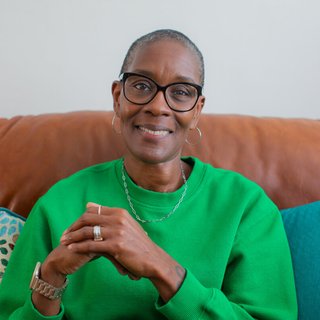Because people are less likely to access support and services
58% of those with blood cancer are not aware of any support potentially available to them when diagnosed. Alice explains what it's like answering calls on the support services helpline.
People are missing out
Too often, people are not aware their condition is a type of blood cancer, and therefore miss out on what they are entitled to.
In many cases, people are not only unaware their condition is a type of blood cancer, but they do not even know it is a type of cancer.
Our survey of people with blood cancer suggested that at the point of diagnosis, 58% of participants were not aware of any potential support that might be available to them. Any cancer diagnosis can cause financial hardship, but unfortunately, the data tells us that a blood cancer diagnosis is more financially costly than other types of cancer.
Financial burdens
Yet despite this, just a quarter (25%) of people with a diagnosis were aware of help with health costs (such as free prescriptions), only 15% knew they were entitled to larger financial benefits (such as PIP, ESA and Carers Allowance), and only 9% knew that their blood cancer diagnosis made them eligible for one-off grants and loans to help with the extra costs cancer can cause.
We also found that awareness was even lower for those on a below-average income – the very people who could benefit the most from accessing the financial help they are entitled to.
Legal and employment rights
And it’s not just financial benefits people aren't aware of: only 12% knew they have legal protections under the Equality Act – information that could help many people when engaging in tough discussions with their employer.
In fact, many people affected by blood cancer tell us that if they’d known their condition was a type of cancer, it would have been easier to explain to their employer. Too often employers hear words such as 'lymphoma' and 'myeloma' and assume people don’t need as much support as colleagues with a breast or lung cancer diagnosis.
Accessing support services
We’ve also heard from our community that they’ve been turned away from cancer support services, because those running them don’t recognise certain types of blood cancer as being a cancer.
Raising awareness of blood cancer could help address this. In our survey, 45% of people with blood cancer believed that lack of awareness of blood cancer is making people less likely to access the support and services they need and are entitled to.
We know that our services make a huge difference to people’s lives, and give them a sense of ownership and control over their condition. But people are less likely to use these services if they do not know that their condition is a type of cancer or blood cancer.
Gemma Trout, Support Services Nurse:
"We know that often the information given by a person's medical team is focused on the condition itself. Sadly, there is less emphasis and less time available in appointments to talk through other types of support and how families can access them at any stage."
Our support services
There's a lot of support available to people with blood cancer that can help them as they adjust to their condition, whether that its financial or legal support, or just having someone to talk to.
Making blood cancer as well-known as other common cancers could help unlock that support for the people who need it. This would in turn lead to less financial hardship for people with blood cancer, and more protection against things like discrimination at work.
As a charity that delivers support services, we know the important role that our services (and the services run by other charities) play in helping people with blood cancer manage their condition and access support that improves their quality of life.
But the stark fact is that these services are not reaching enough people and our own experience tells us that it is often people from ethnic minority groups in particular who are missing out.
And it’s not just about drawing strength from a supportive community. At Blood Cancer UK, we have shown what can happen when people affected by blood cancer join together as a community to amplify each others’ voices and advocate for vital research funding.
The more we can increase awareness of blood cancer, the more people will know about the support available to them and the strength in numbers we can unlock together.

